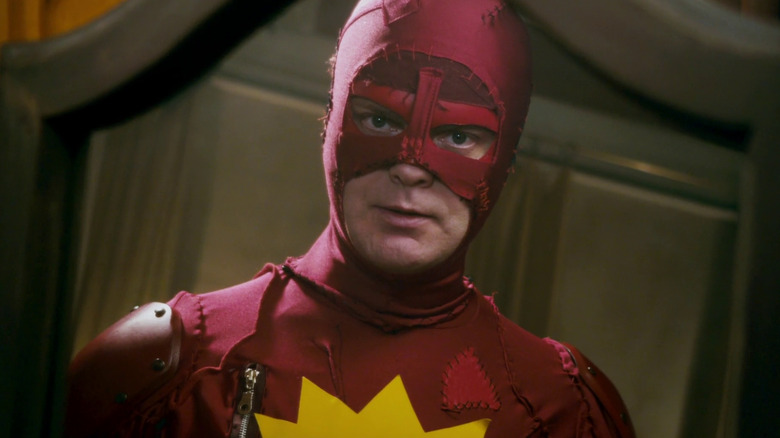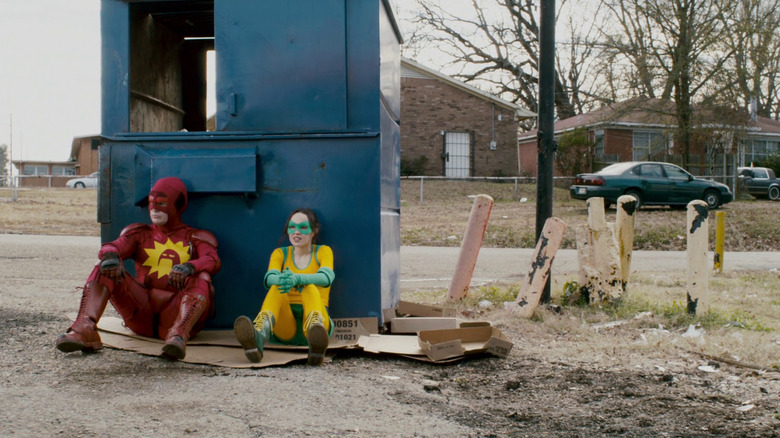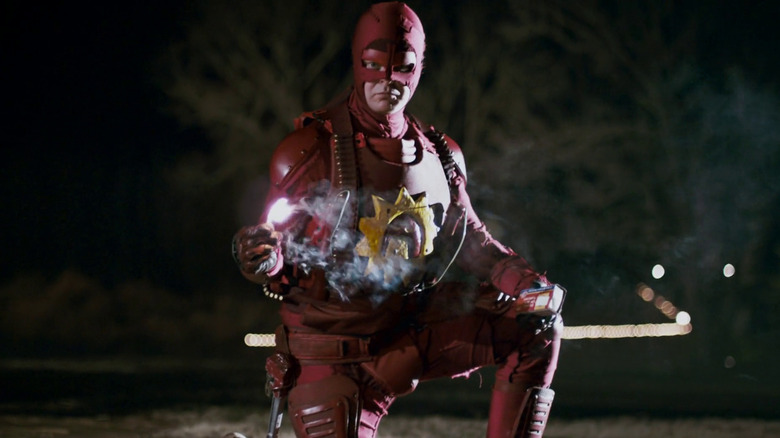James Gunn's First Superhero Movie Was A Forgotten Black Comedy With Rainn Wilson
If you knew James Gunn's early work before he conquered the world with a bunch of lovable misfits through Marvel's "Guardians of the Galaxy" movies, there might be a part of you (just a tiny bit) that feels bittersweet about him becoming the big-shot superhero filmmaker and CEO of DC Studios he is today. Don't get me wrong: God bless Gunn for giving us the cinematic versions of Peter (Chris Pratt), Gamora (Zoe Saldana), Groot (Vin Diesel), Rocket (Bradley Cooper), Drax (Dave Bautista), and all the quirky creatures in that spectacular universe. He even turned the previously botched "Suicide Squad" into a decent and enjoyable blockbuster that it deserved to be.
But before all that, there was a rare potential in Gunn to become one of the most intriguing and singular directors of his generation. I'm saying that because he started as a trash horror enthusiast at Troma Entertainment, and his first feature (which he wrote and directed), "Slither," a horror comedy that wound up a cult classic, showcased a distinctive vision we don't see much anymore. In that film, his passion for horror, goofy characters, and dark humor was dripping from every scene. He was well-versed in the genre and knew how to craft amusing, relatable, and vulnerable characters we were inclined to root for — it's why "GOTG" became instantly lovable in the first place. Yet instead of going down the rough and bumpy path of horrors, he chose another direction.
That brings us to his second feature, "Super," a criminally underrated pseudo-superhero flick in which Gunn has taken his weirdo approach and morbid sense of humor even further than before.
Super was Gunn's experiment (and eventually blueprint) for developing a likable misfit
"Super's" protagonist, Frank Darbo (Rainn Wilson channelling his inner lunatic that made him a star in "The Office"), was the blueprint of the reject/loser-type protagonist that Gunn done to perfection four years later in "Guardians of the Galaxy Vol. 1." It was somewhat of an experiment for the writer-director to see how far he could take a resigned, slightly delusional, and loony character, and turn him into a hero (in an R-rated movie nevertheless that granted him a much-needed creative freedom). Therefore, Frank is rough and unbalanced at times, but it's also strangely grounded and real because of his ordinariness.
When we first meet him, he's the antithesis of cool — boring, wimpy, and unattractive. His pretty wife, Sarah (Liv Tyler), is with him out of gratitude. Frank helped her get clean from her drug addiction, so she married him. But whatever it was that made Sarah fall for him had worn off a long time ago. Their marriage no longer functions. So it's hardly a surprise that Kevin Bacon's macho drug dealer and strip club owner swoops in to snatch her away from him in an instant. At first, Frank feels utterly depressed and powerless against this douchebag, but for once in his sorry-ass life, he finds the courage to stand up to the bully and defend what's his. Well, only after he's touched by the finger of God and meets the Holy Avenger (Nathan Fillion) (the fictional character of a bizarrely religious network show who tells him to fight crime) in a disturbing vision. After all, we all need some divine purpose to fight on.
Of course, Frank is a weirdo. So his way to become a superhero, catch criminals, and take his girl back is unusual. He goes to the local comic book store for inspiration — where he also finds his eventual sidekick, the nerdy store clerk, Libby (Elliot Page) — and comes up with his un-caped crusader persona, The Crimson Bolt. Lacking any supernatural ability, muscle, or wit, he has to deal with the bad guys in his own way. So he puts on a poor-man's Daredevil costume, grabs a pipe wrench, and develops the catchphrase, "Shut up, crime!" With that, he's ready to dive in and become a savior — until reality kicks him in the nuts.
The world wasn't ready for the Crimson Bolt
Although "Super" was a critical and commercial failure at the time of its release, it served as the movie that helped Gunn find his voice. In retrospect, he basically extended upon the same tone that made "Slither" a blast. While that film celebrated and paid homage to specific horror tropes, "Super" aimed to forge its own path by turning superhero clichés on their heads. Admirably, it was also shot on a significantly lower budget ($2.5 million as opposed to "Slither's" $15 million), which forced Gunn to come up with cheaper yet inventive visuals and narrative gimmicks that greatly complemented the story's primary spirit.
However, the fact that it came out right after Matthew Vaughn's beloved and thematically similar "Kick-Ass" didn't help. In terms of scale and action, Gunn's film had no chance to compete. Its excessive violence, black humor, and sometimes odd sexual energy might have been off-putting to a general movie-going audience. Most of the world just wasn't ready for such an eccentric and awkward hero as the Crimson Bolt. To the fans of "Slither" (like myself), however, "Super's" over-the-top bonkerness seemed like the natural evolution of a filmmaker who felt most alive in the intersection of funny and weird.
"Slither" and "Super" were refreshingly original and alluring, which always made me wonder what Gunn could've done if he hadn't been sucked in by the big studios. If there was an alternate universe where he stuck to making deranged horrors and twisted comedies, mixing up genres any way he wanted, and carving out a different space in the land of pop culture than what he ended up with. I guess we'll never know. But at least we'll always have these two movies to go back to if we get tired of "Superman" and whatever other superhero Gunn might bring us on the big screen in the coming years.


